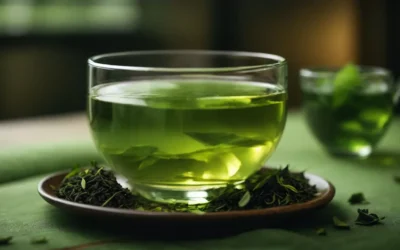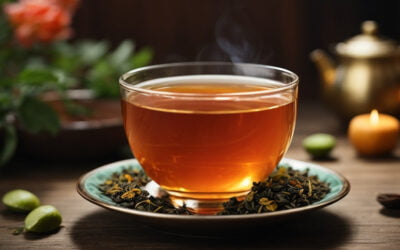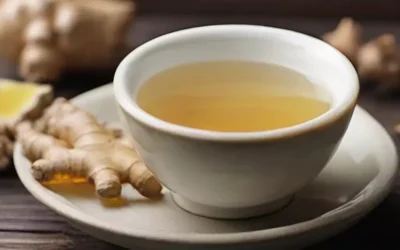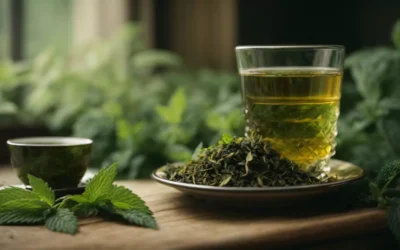Dandelion tea, made from the herbaceous plant Taraxacum officinale, is a popular herbal beverage known for its use in traditional medicine. The tea is derived from the flower extracts of dandelions. With its growing popularity as an herbal beverage, more and more people are discovering the numerous benefits of organic roasted dandelion root tea. This tea is made from the roots of the dandelion plant, which is known for its medicinal properties.
In addition to the roots, dandelion leaves and dandelion greens can also be used to make this refreshing and healthy drink. Made from the roots and leaves of the dandelion (Taraxacum officinale) herb, this tea is known for its potential to support digestion, liver health, and overall well-being. Dandelions are beneficial plants.
The dandelion root extract from the taraxacum officinale plant used in this tea contains valuable compounds such as vitamins, minerals, and antioxidants that contribute to its therapeutic properties for healthy digestion. The extract is derived from the flower. Whether you’re looking to boost healthy digestion or simply enjoy a flavorful beverage, dandelion tea (taraxacum officinale) provides a refreshing and natural option.
Let’s explore the wonders of dandelion tea (taraxacum officinale) and uncover why it has become an increasingly popular choice among health-conscious individuals looking to boost healthy digestion.
- Unveiling the Health Benefits of Dandelion Tea
- Detoxifying Qualities of Dandelion Tea
- Recipe Essentials for Homemade Dandelion Tea
- The Unique Appeal of Roasted Dandelion Root Tea
- Dandelion Tea Consumption: Safety and Frequency
- Nutritional Profile and Vitamin Content of Dandelion Tea
- Managing Health Conditions with Dandelion Tea
- Alternative Herbal Teas to Dandelion
- Conclusion
- FAQs
Unveiling the Health Benefits of Dandelion Tea
Rich Source of Antioxidants
Dandelion tea, made from the taraxacum officinale plant, is a natural way to boost antioxidant intake. Antioxidants protect our bodies from free radicals, and harmful molecules that can cause damage. These dandelion greens, dandelion leaves, and dandelion roots contain antioxidants that can help reduce inflammation and oxidative stress in the body, promoting overall health and well-being. Try our organic roasted dandelion root tea for added benefits.
Supports Liver Health and Detoxification
One of the potential health benefits of taraxacum tea is its ability to support liver health and aid in detoxification. The liver plays a crucial role in filtering toxins from our blood, and dandelion tea, also known as taraxacum, may help enhance this process. The organic roasted dandelion root tea contains compounds that stimulate bile production, et al, which aids in digestion and assists the liver in eliminating waste products effectively.
May Aid Digestion and Promote Weight Loss
Drinking dandelion tea may also have positive effects on digestion and weight loss efforts. This herbal beverage has been traditionally used to promote healthy digestion by stimulating appetite, improving nutrient absorption, and reducing bloating or discomfort. It acts as a natural diuretic, helping to eliminate excess water weight from the body.
Dandelion tea can be a great alternative to sugary beverages or calorie-laden drinks when trying to shed some pounds. It is low in calories yet rich in nutrients, making it an excellent choice for those looking to maintain a healthy weight.
Heart Health Benefits
Research suggests that dandelion tea may offer potential benefits for heart health. The antioxidants present in this herbal infusion can help reduce cholesterol levels and lower blood pressure, both of which are key factors contributing to heart disease risk. By incorporating dandelion tea into your daily routine alongside other heart-healthy habits like regular exercise and a balanced diet, you may be able to support your cardiovascular system.
Promotes Healthy Kidney Function
Another remarkable benefit of dandelion tea is its potential for promoting healthy kidney function. This herbal remedy has been traditionally used as a diuretic, helping to increase urine production and flush out toxins from the kidneys. By supporting proper kidney function, dandelion tea may aid in maintaining optimal overall health.
Incorporating dandelion tea into your daily routine can provide you with a range of potential health benefits. However, it’s important to note that individual responses may vary. If you have any underlying health conditions or concerns, it’s always best to consult with a healthcare professional before making any significant changes to your diet or lifestyle.
Remember, dandelion tea is not a magical cure-all, but it can be a flavorful and beneficial addition to a well-rounded healthy lifestyle. So why not give this herbal beverage a try and see how it can contribute positively to your overall well-being?
Detoxifying Qualities of Dandelion Tea
Natural Diuretic Properties
Dandelion tea is known for its natural diuretic properties, which can help flush out toxins from the body. A diuretic is a substance that promotes increased urine production and helps eliminate excess fluid from the body. By acting as a natural diuretic, dandelion tea aids in detoxification by stimulating the kidneys to produce more urine, thus facilitating the removal of waste materials and harmful substances.
Support for Kidney Function and Water Retention Reduction
In addition to its diuretic effect, dandelion tea also supports kidney function. The kidneys play a crucial role in filtering waste products from the blood and maintaining fluid balance in the body. By promoting healthy kidney function, dandelion tea assists in eliminating toxins effectively.
Moreover, dandelion tea can help reduce water retention. Water retention occurs when excess fluid builds up in the body’s tissues, leading to bloating and swelling. The diuretic properties of dandelion tea aid in reducing water retention by increasing urine output and flushing out excess fluid.
Cleansing Effect on Body Systems
Dandelion tea, et al, possesses cleansing properties that can benefit various systems within the body. It contains antioxidants that help combat free radicals – unstable molecules that can cause damage to cells and contribute to chronic diseases. Antioxidants work by neutralizing these free radicals, thereby protecting cells from oxidative stress.
Dandelion tea has anti-inflammatory properties that may support overall health. Chronic inflammation is associated with various health conditions such as heart disease, diabetes, and certain types of cancer. By reducing inflammation in the body, dandelion tea may contribute to improved overall well-being.
Furthermore, regular consumption of dandelion tea, et al, can assist in digestive system cleansing. It aids digestion by promoting bile production in the liver and supporting gallbladder function. Bile plays a vital role in breaking down fats and aiding in their absorption. By enhancing the efficiency of the digestive process, dandelion tea helps to cleanse and maintain a healthy digestive system.
Recipe Essentials for Homemade Dandelion Tea
Harvest Fresh Dandelion Leaves and Roots
To make homemade dandelion tea, gather fresh dandelion leaves and roots, et al. Look for dandelions growing in areas that have not been treated with chemicals or pesticides. You can find them in your backyard, a nearby park, or even along the roadside. Make sure to wear gloves while harvesting to protect your hands from any prickly sensations, et al.
Boil Water and Steep Dandelion Parts for Desired Duration
Once you have collected the dandelion leaves and roots, it’s time to prepare the tea. Start by boiling water in a pot or kettle. While waiting for the water to boil, rinse the harvested dandelion parts thoroughly to remove any dirt or debris. Chop the leaves and roots into small pieces using a sharp knife.
After the water has reached its boiling point, add the chopped dandelion leaves and roots into the pot or kettle. Allow them to steep for about 10-15 minutes. This will help extract all those beneficial compounds present in dandelions, such as vitamins A, C, and K, as well as minerals like iron and potassium.
Optional: Add Honey or Lemon for Flavor Enhancement
If you prefer a sweeter taste, you can add a teaspoon of honey to your freshly brewed dandelion tea. Honey not only adds sweetness but also provides additional health benefits like soothing sore throats and boosting immunity.
Alternatively, if you enjoy a tangy twist, squeeze some fresh lemon juice into your tea. Lemon adds a refreshing flavor while providing vitamin C and antioxidants that promote overall well-being.
Remember that adding honey or lemon is optional; it all depends on your personal preference. Feel free to experiment with different flavors until you find what suits your taste buds best.
By following these simple steps – harvesting fresh dandelion leaves and roots, boiling water and steeping the dandelion parts for the desired duration, and optionally adding honey or lemon for flavor enhancement – you can create your very own homemade dandelion tea. Enjoy the earthy taste and reap the health benefits that this natural herbal tea has to offer.
The Unique Appeal of Roasted Dandelion Root Tea
Nutty, Coffee-Like Flavor Profile
Roasted dandelion root tea offers a unique and enticing flavor profile that is often compared to coffee. With its nutty undertones and rich aroma, this tea provides a satisfying alternative for those seeking a caffeine-free beverage. The roasting process brings out the natural flavors of the dandelion root, resulting in a brew that surprises with its depth and complexity.
Suitable Caffeine-Free Alternative to Coffee or Black Tea
For individuals looking to reduce their caffeine intake or eliminate it altogether, roasted dandelion root tea is an excellent choice. Unlike green tea or black tea, which contain varying levels of caffeine, this herbal infusion allows you to enjoy a warm and comforting beverage without the stimulating effects of caffeine. So if you’re craving a hot drink but don’t want the jitters that can come with coffee or traditional teas, give roasted dandelion root tea a try.
Additional Health Benefits Compared to Regular Dandelion Tea
While regular dandelion tea made from the flowers of the plant (Taraxacum officinale) offers its own set of health benefits, organic roasted dandelion root tea takes it up a notch. The roasting process not only enhances the flavor but also unlocks additional health-promoting properties in the roots. Rich in antioxidants and vitamins A, C, and K, this herbal brew may support liver function, aid digestion, and promote overall well-being.
The bitterness commonly associated with dandelions becomes more pronounced when the roots are roasted. However, don’t let that deter you! Embrace those bitter notes as they add depth to your cuppa and make it an invigorating experience for your taste buds.
So why not step away from your usual go-to beverages like coffee or green tea? Give roasted dandelion root tea a chance to surprise and delight you with its unique flavor profile. Whether you’re looking for a caffeine-free alternative or seeking additional health benefits, this herbal brew has got you covered.
Dandelion Tea Consumption: Safety and Frequency
Generally Safe for Most Individuals
Dandelion tea is generally considered safe for most individuals when consumed in moderation. It has been used for centuries in traditional medicine practices and is known for its potential health benefits. However, it is important to note that individual reactions may vary, so it’s always a good idea to listen to your body and consult with a healthcare professional if you have any concerns.
Consult with Healthcare Professional if Pregnant, Breastfeeding, or on Medication
If you are pregnant, breastfeeding, or taking any medications, it is advisable to consult with your healthcare professional before consuming dandelion tea. While dandelion tea is generally safe, certain compounds present in the tea may interact with medications or have an impact on hormonal levels during pregnancy and breastfeeding. Your healthcare provider will be able to provide personalized guidance based on your specific situation.
Recommended Daily Intake Varies Based on Individual Needs
The recommended daily intake of dandelion tea varies based on individual needs. Some people may choose to enjoy a cup of dandelion tea once a day as part of their routine, while others may drink it occasionally as desired. It’s important to remember that moderation is key when consuming any herbal beverage.
When incorporating dandelion tea into your routine, consider factors such as your overall health, lifestyle, and any existing medical conditions. If you are using dandelion tea specifically for its potential health benefits or as part of a detoxification regimen, it’s best to follow the recommendations provided by a qualified healthcare professional or herbalist.
Nutritional Profile and Vitamin Content of Dandelion Tea
Dandelion tea is not only a refreshing beverage but also packed with essential nutrients. Let’s take a closer look at its nutritional profile and vitamin content.
Dense in Vitamins A, C, and K
Dandelion tea is a powerhouse. It contains high levels of vitamins A, C, and K. Vitamin A plays a crucial role in maintaining healthy vision, supporting the immune system, and promoting cell growth. Vitamin C is known for its antioxidant properties that help protect the body against harmful free radicals and boost the immune system. Vitamin K contributes to blood clotting and bone health.
Rich in Minerals like Iron, Calcium, Potassium
Apart from vitamins, dandelion tea is also rich in minerals that are vital for our overall well-being. It contains significant amounts of iron, calcium, and potassium. Iron helps transport oxygen throughout the body and prevents anemia. Calcium is essential for strong bones and teeth while also supporting heart health. Potassium aids in regulating blood pressure levels and maintaining proper muscle function.
Low-calorie beverage with No Fat or Cholesterol
If you’re looking for a guilt-free drink option, dandelion tea fits the bill perfectly! It is a low-calorie beverage that won’t add unwanted pounds to your waistline. Plus, it contains no fat or cholesterol, making it an excellent choice for those watching their weight or trying to maintain a healthy heart.
Dandelion tea offers numerous health benefits due to its impressive nutritional profile. Regular consumption can provide you with essential vitamins like A, C, and K while supplying your body with important minerals such as iron, calcium, and potassium. Moreover, this delightful brew has zero fat or cholesterol content—a great alternative to sugary beverages that contribute to weight gain.
Incorporating dandelion tea into your daily routine can be a simple yet effective way to boost your overall health. Whether you enjoy it hot or cold, this herbal drink provides a refreshing and nutritious option that supports your body’s needs.
Managing Health Conditions with Dandelion Tea
Supports Healthy Blood Sugar Levels
Drinking dandelion tea may have potential benefits for managing blood sugar levels. Studies suggest that certain compounds found in dandelion tea can help regulate glucose metabolism and improve insulin sensitivity. This means that dandelion tea could potentially be beneficial for individuals with diabetes or those at risk of developing the condition. However, it is important to note that more research is needed to fully understand the effects of dandelion tea on blood sugar levels.
May Reduce Inflammation Associated with Arthritis
Arthritis is a common condition characterized by inflammation in the joints, causing pain and discomfort. Dandelion tea has been traditionally used as a natural remedy for arthritis due to its anti-inflammatory properties. Some studies have shown that dandelion extract can help reduce inflammation and alleviate symptoms associated with arthritis. While further research is needed to confirm these findings, incorporating dandelion tea into your routine might offer some relief for arthritis-related inflammation.
Potential Benefits for Digestive Disorders such as Constipation
Dandelion tea has long been used as a natural remedy for digestive issues, including constipation. It contains compounds known as prebiotics, which promote the growth of beneficial gut bacteria and support healthy digestion. The diuretic properties of dandelion tea may also help stimulate bowel movements and relieve constipation. However, it’s essential to consult with a healthcare professional before using dandelion tea as a treatment for any digestive disorder.
It’s important to note that while drinking dandelion tea may offer potential benefits, it should not replace prescribed medications or medical advice from healthcare professionals. Certain medications can interact negatively with herbal remedies like dandelion tea, so always consult your doctor before incorporating it into your routine.
Dandelion tea can also be found in health food stores and is often considered a safe and natural option for various health concerns. However, it’s crucial to be aware of any potential allergies or adverse reactions before consuming dandelion tea. If you have any underlying health conditions or are taking medications, it’s best to consult with your healthcare provider before adding dandelion tea to your diet.
Alternative Herbal Teas to Dandelion
When it comes to herbal teas, there are plenty of options beyond the popular choices like green tea and chamomile tea. If you’re looking to explore new flavors and enjoy the health benefits that herbal teas can offer, consider trying some of these options:
- Nettle Tea: Nettle tea is known for its detoxifying properties and is often used to support kidney and liver health. It’s also a great source of vitamins and minerals.
- Ginger Tea: Ginger tea is a popular herbal tea with numerous health benefits. It soothes the digestive system, alleviates nausea and indigestion, and has anti-inflammatory properties. It can also boost the immune system and help reduce muscle pain and soreness. Adding ginger tea to your collection provides a range of health benefits.
- Jasmine Tea: Jasmine tea is not only fragrant and delicious, but it also offers a range of health benefits. It’s rich in antioxidants, which can help protect against chronic diseases and promote heart health.
- Peppermint Tea: Peppermint tea is well-known for its soothing properties and ability to relieve digestive issues like bloating and indigestion. It’s also refreshing and can help alleviate headaches.
- Chamomile Tea: Chamomile tea is often enjoyed before bed to promote relaxation and improve sleep quality. It’s also known for its anti-inflammatory properties and can help with digestive issues.
- Ginseng Tea: Ginseng tea is believed to boost energy levels, improve cognitive function, and enhance immune system function. It’s a popular choice for those looking for a natural energy boost.
- Chrysanthemum Tea: Chrysanthemum tea is commonly consumed in Asian cultures and is believed to have cooling properties. It’s often used to alleviate symptoms of the common cold, such as sore throat and fever.
- Honeysuckle Tea: Honeysuckle tea is known for its immune-boosting properties and is often used to alleviate symptoms of the common cold and flu. It has a pleasant floral flavor.
- Gunpowder Tea: Gunpowder tea is a type of green tea that is rolled into small pellets. It has a slightly smoky flavor and is rich in antioxidants, making it a great choice for overall health.
- Pu-erh Tea: Pu-erh tea is a fermented tea that is known for its digestive benefits. It can help with weight management, cholesterol levels, and blood sugar control.
Conclusion
In conclusion, dandelion tea offers a wide range of health benefits and is a versatile herbal beverage. The previous sections have highlighted its detoxifying qualities, nutritional profile, and potential for managing various health conditions. With its rich vitamin content and unique appeal, dandelion tea can be a valuable addition to one’s daily routine.
For those looking to explore alternative herbal teas, dandelion tea stands out as an excellent choice. Its natural properties make it a safe and effective option for promoting overall well-being. Whether enjoyed as a hot or cold beverage, homemade or store-bought, dandelion tea provides a refreshing and healthful experience.
Consider incorporating dandelion tea into your daily routine and reap the benefits of this remarkable herbal infusion. Start exploring the various recipes and options available, and discover the positive impact it can have on your health. Embrace the power of nature with dandelion tea and embark on a journey towards better wellness.
FAQs
What are the potential health benefits of dandelion tea?
Dandelion tea is believed to have several potential health benefits. It may aid in digestion, support liver function, promote healthy skin, and act as a diuretic. It contains antioxidants that can help reduce inflammation and protect against certain diseases.
Can dandelion tea help with weight loss?
While dandelion tea is often associated with weight loss, there is limited scientific evidence to support this claim. It may have a mild diuretic effect and can potentially reduce water retention, but it should not be relied upon as a primary method for weight loss.
Is dandelion tea safe to consume during pregnancy?
Pregnant women should exercise caution when consuming dandelion tea. Its diuretic properties may lead to increased urine production and potentially affect electrolyte balance. It is advisable to consult with a healthcare professional before including dandelion tea in your diet during pregnancy.
How do I brew dandelion tea?
To brew dandelion tea, steep 1-2 teaspoons of dried dandelion leaves or root in boiling water for about 5-10 minutes. Strain the mixture and enjoy it hot or cold. You can also add honey or lemon for flavor if desired.
Are there any side effects of drinking dandelion tea?
While generally considered safe for most people, some individuals may experience allergic reactions or digestive issues like diarrhea or stomach discomfort after consuming dandelion tea. If you have known allergies or sensitivities, it’s best to consult with a healthcare professional before trying it.











